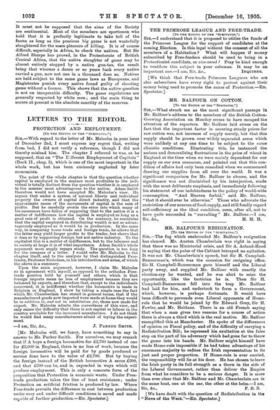[TO THE EDITOR OF THE "SPEOTATOlt.'l
Sr,—With regard to the letter of Mr. Malcolm in your issue of December 2nd, I must express my regret that, writing from bed, I did not verify a reference, though I did not thereby mislead him. The chapter I referred to was, as he supposed, that on "The Different Employment of Capitals" (Book H., chap. 5), which is one of the most important in the
whole work, but has been curiously neglected by later economists.
The point • of the whole chapter is that the question whether capital is employed in the manner most profitable to the indi- vidual is totally distinct from the question whether it is employed in the manner most advantageous to the nation. Adam Smith therefore would not have accepted Mr. Malcolm's view. He argues that under a system of natural liberty and individual property the owners of capital direct industry, and that the approximate cause of the movements of capital is the rate of profits. But he carefully avoids the error into which many of his successors have fallen of supposing that to the nation it is a matter of indifference how the capital is employed so long as a good rate of profit is obtained. On the contrary, he maintains that the capital employed in distributing wealth is not so advan- tageously employed as it would be in production. In the same way, in comparing home trade and foreign trade, he allows that the latter may yield larger profits to the trader, but shows that it does so by supporting foreign but not native industry. To the capitalist this is a matter of indifference, but to the labourer and to society at large it is of vital importance. Adam Smith's whole argument most amply repays study. The question is too low:, for the compass of a letter. I would refer Mr. Malcolm to the chapter itself, and to the analysis by that distinguished Free- trader, Professor Nicholson, in his introduction and notes, of which the above is a summary.
Upon the main argument, however, I claim Mr. Malcolm as in agreement with myself, ILE opposed to the orthodox Free- trade position held by yourself and others, which is that foreign imports mean no loss of employment because they are balanced by exports, and therefore that, except to the individuals concerned, it is indifferent whether the locomotive is made in Belgium or England. I show by taking a single case the fact which Mr. Chamberlain has stated in general terms, that if the manufactured goods now imported were made at home they would be in addition to, and not in substitution for, those now made for export. Mr. Malcolm admits the correctness of this view, and only raises the difficulty that there is not capital or labour in the country available for the increased manufacture. I do not think he would find many manufacturers afraid of trying the experi- ment.
[Mr. Malcolm will, we fancy, have something to say in answer to Mr. Parker Smith. For ourselves, we may remark that if A buys a foreign locomotive for £2,700 instead of one for £3,000 in England, there is no loss of work, because the foreign locomotive will be paid for by goods produced or service done here to the value of 22,700. But by buying the foreign instead of the British locomotive A saves 2300,
and that 2300 can be, and is, expended in ways which will produce employment. This is only a concrete form of the proposition that Protection is economic waste. Under Free- trade production takes the line of least resistance ; under Protection an artificial friction is produced by law. Where Free-trade prevails the difference in cost between production under easy and under difficult conditions. is saved and made capable of further production.—ED. Spectator.


















































 Previous page
Previous page